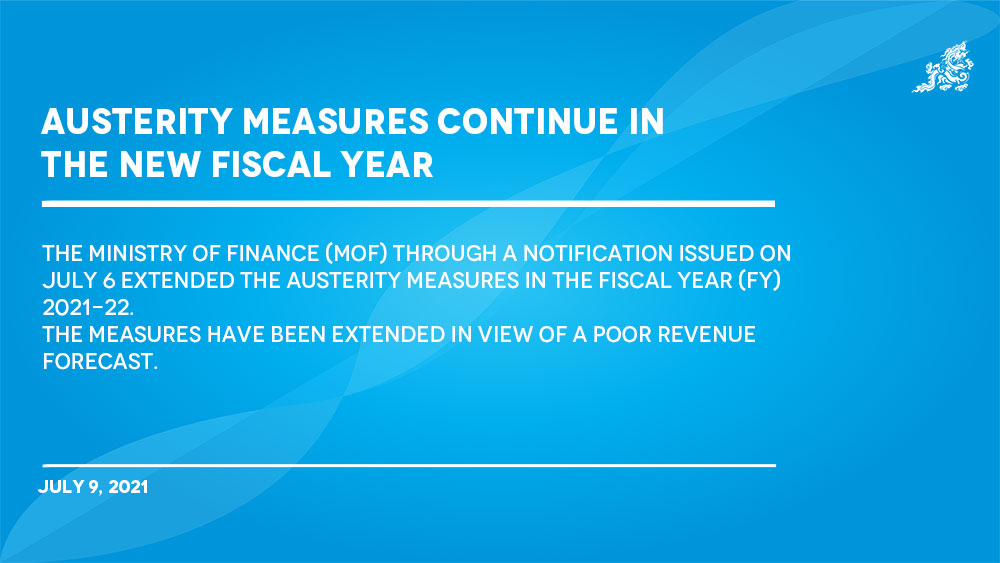MB Subba
The Ministry of Finance (MoF) through a notification issued on July 6 extended the austerity measures in the fiscal year (FY) 2021-22.
The measures have been extended in view of a poor revenue forecast.
As per estimates, the domestic revenue is just enough to cover the recurrent expenditure, which means that the entire capital budget will be financed through external grants, concessional external and domestic borrowings.
The notification states that the government will further rationalise the recurrent expenditure if the revenue performance falls below the estimate.
While the recurrent expenditure must be met from the domestic revenue, data of the past five years show the current expenditure has been increasing faster than the domestic revenue.
Agencies have been notified to postpone the activation of salary indexation and transfer of civil servants will be without transfer benefits.
The government has also notified that the option to monetise the vehicle quota will be postponed, but without affecting the date of next allotment.
To ensure that the capital budget is provided only for critical and Covid-19 related activities, the government has deferred all new constructions and procurement of vehicles.
The government has notified that official travels both within and outside the country should be rationalised within the approved budget. The ministry has notified that no hiring of private buildings for office space will be allowed.
The government has empowered local governments and central agencies to reprioritise activities within the approved allocation.
The ministry has asked agencies to accord the highest priority to the capital activities that were not completed in the last fiscal while apportioning and reprioritising the budget.
While the government has provided the budget for mandatory training, ad-hoc training will have to be approved by Royal Civil Service Commission (RCSC).
The ministry has also asked budgetary bodies to initiate Annual Procurement Plan (APP) to avoid last-minute spending and ensure timely procurement so that budget does not lapse. Under-utilisation of the budget has been one of the main concerns.
The ministry has asked local governments to take into consideration the cross-cutting aspects such as gender, disaster, climate change, environment and beautification while prioritising activities for the fiscal year.
As per the directives of the Cabinet, the Department of National Budget will carry out an impact assessment of the annual grants and review its guidelines accordingly.
The government has given the task of maintaining gewog centre roads to the gewog administration.
About 50 percent of the budget has been allocated to local governments.
Trashigang’s Bartsham Gup, Kezang Dawa, said that the budget was not adequate for activities such as maintenance of roads and that the gewogs’ ability to meet development targets could be affected. “The unavailability of workers are also going to pose challenges,” he said.
Drakten Gup Kinzang Dorji said that local governments were given more autonomy in the utilisation of budget and that it had helped gewogs in meeting the people’s aspirations. “But the amounts were not adequate to meet the 12th Plan targets.”
The Parliament recently passed the annual budget of Nu 80.483 billion (B) for the fiscal year (FY) 2021-22.
The total resources for the FY is estimated at Nu 56.765B, of which internal resources is Nu 36.24B and external grants of Nu 20.525B million. The fiscal deficit is estimated at Nu 17.153B, which is 8.59 percent of the GDP.
Edited by Tashi Dema


